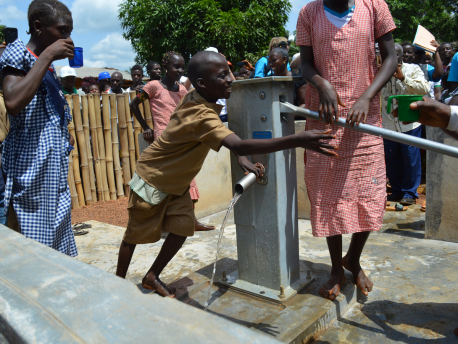
Delivering Sustainable, Equitable Water in Guinea
Safe water saves lives. UNICEF USA Humanitarian Circle member Andy Astrachan is helping UNICEF deliver a scalable, cost-efficient water solution for children who need it most.
Ten years ago, on the morning of his fiftieth birthday, Andy Astrachan awoke with a thought that would prove to change the lives of many. “I woke up that morning laser-focused on a single idea. I had to go to Africa and dig a water well,” he says. Sure, it sounds a bit unbelievable, he admits, “but it’s the truth.”
Five months later, Astrachan was on his way to Zambia, where, with the help of two local hosts, he facilitated the revitalization of a decades-ago collapsed well in a village outside of Mfuwe.
“My intentions were to grab a shovel and dig. I’d like to say I was a super active participant in the labor, and it would be a better story if I was, but, in the end, I was more of a helper,” Astrachan laughs.
When the water first came out of the spout, the joy on the faces of the kids – that’s probably the most powerful thing I’ve ever seen.
The well, set at a local school, immediately transformed the village. No longer did women and children have to walk miles through dangerous terrain to fetch water. No longer did they worry about whether the water at the end of that journey was safe to drink.
“When the clean water first came out of the spout, the joy on the faces of the kids – that’s probably the most powerful thing I’ve ever seen. I knew right then and there that I could do a lot more,” Astrachan says.

UNICEF USA Humanitarian Circle member Andy Astrachan joins children utilizing the well he helped to revive in Zambia. © Andy Astrachan
In 2013, UNICEF USA presented to Astrachan just such an opportunity in Guinea, where rural communities have little access to safe water, resulting in a ranking of 11th worst for mortality in children under 5. One quarter of the country's child deaths are caused by diseases attributable to unsafe water. The proposed project intended to determine the financial and logistical viability of manually drilling large numbers of boreholes in small, remote villages.
As CEO of a merchant bank he founded, Astrachan has an affinity for efficiency and scalability. A self-described “venture philanthropist,” he is willing to accept risk on projects that, if successful, “have the potential to be game-changers,” he says.
Over five years, UNICEF’s manual drilling partnership with Andy’s AJA Charitable Foundation produced 123 wells providing more than 83,000 people direct access to clean, safe drinking water in 122 rural communities.

Kids chanting “Water is Life!” in N’Zerefore, proud of their AJA Charitable Foundation-funded waterpoint. © Marjolein Steenbergen for UNICEF USA
The goal of investing in the pilot project was to see if we could deliver water to the most people in the least expensive way in a manner that could be replicated. So, even more important than the wells themselves is the fact that we have proven overwhelmingly the compelling economics of manually drilling for water to serve smaller, remote communities,” says Astrachan.
The goal was to see if we could deliver water to the most people in the least expensive way.
Seeking to build upon the pilot program’s success, AJA Charitable Foundation is again partnering with UNICEF to expand manual drilling operations across Guinea. The next phase of the project aims to drill new boreholes in 167 villages and retrofit 20 existing wells with solar-powered pumping systems which not only allow sustainable access to water at greater depths, but can also contribute electricity to nearby schools and health centers.
This next phase is expected to create, and in the case of retrofitted wells greatly improve, access to clean water for at least 210,000 people.
Water is a human right. Thanks to Astrachan’s generous support, through Water for Guinea, UNICEF is delivering safe, clean water to thousands of children in Guinea. And if the results thus far are any indication, millions around the world stand to benefit in the future.
To learn more about the impact of the first phase of this project, watch the short video below:
Photo at top: Children in Guinea gather water from a UNICEF-installed water pump in N’Zerekore. © UNICEF
HOW TO HELP
There are many ways to make a difference
War, famine, poverty, natural disasters — threats to the world's children keep coming. But UNICEF won't stop working to keep children healthy and safe.
UNICEF works in over 190 countries and territories — more places than any other children's organization. UNICEF has the world's largest humanitarian warehouse and, when disaster strikes, can get supplies almost anywhere within 72 hours. Constantly innovating, always advocating for a better world for children, UNICEF works to ensure that every child can grow up healthy, educated, protected and respected.
Would you like to help give all children the opportunity to reach their full potential? There are many ways to get involved.



